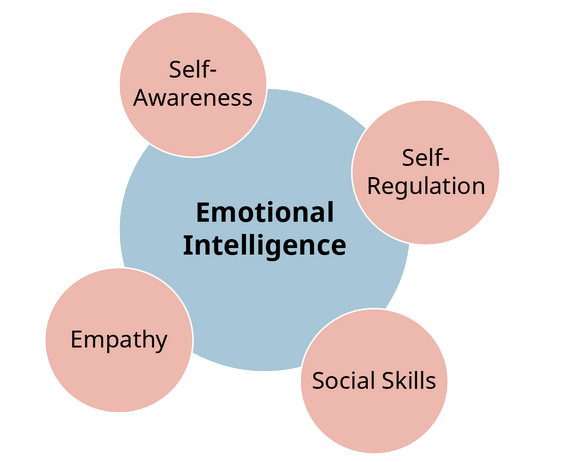2.6 Emotional Intelligence
Learning Objectives
- Consider the role of emotions in individual behaviour such as decision making.
- Explore the concept of emotional intelligence.
The Role of Emotions
Being aware of the role emotions play in decision-making does not mean that we should ignore them. Emotions can serve as powerful signals about what we should do, especially in situations with ethical implications. You can read more about this particular type of decision-making in the Ethics in Practice box later in this chapter. Thinking through how we feel about the possible options, and why we feel that way, can greatly enhance our decision-making.[1] Effective decision-making, then, relies on both logic and emotions. For this reason, the concept of emotional intelligence has become popular as a characteristic of effective managers. Emotional intelligence is the ability to recognize, understand, pay attention to, and manage one’s own emotions and the emotions of others. It involves self-awareness and self-regulation—essentially, this is a toggling back and forth between emotions and logic so that we analyze and understand our own emotions and then exert the necessary control to manage them as appropriate for the situation. Emotional intelligence also involves empathy—the ability to understand other peoples’ emotions (and an interest in doing so). Finally, emotional intelligence involves social skills to manage the emotional aspects of relationships with others. Managers who are aware of their own emotions can think through what their emotions mean in a given situation and use that information to guide their decision-making. Managers who are aware of the emotions of others can also utilize that information to help groups function more effectively and engage in better group decision-making. While emotional intelligence seems to come easily to some people, it is something that we can develop and improve on with practice. A model of emotional intelligence is presented in Figure 1.[2]

The brain processes information to make decisions using one of two systems: either the logical, rational (reflective) system or the quick, reactive system. The reflective system is better for significant and important decisions; these generally should not be rushed. However, the reactive system can be lifesaving when time is of the essence, and it can be much more efficient when based on developed experience and expertise.
Concept Check
- What is emotional intelligence, and why is it important for decision-making?
- What are the two systems of decision-making in the brain?
Chapter adapted from 6.2 How the Brain Processes Information to Make Decisions: Reflective and Reactive Systems in OpenStax Organizational Behavior. CC BY license.
The ability to understand and manage emotions in oneself and in others.
System of decision-making in the brain that is logical, analytical, and methodical.

